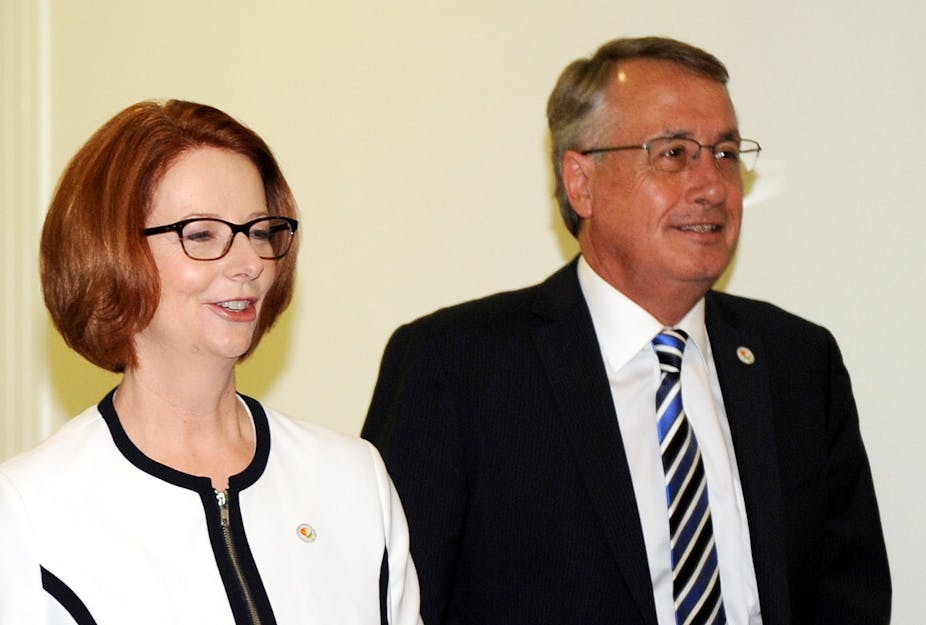Julia Gillard hardly had time for some deep breathing after the cyclone of last week, before her government was hit by fresh buffeting winds.
A new round of speculation that the budget would hit superannuation, drownings at sea as many more boat people arrive, giving fresh impetus to the asylum seeker debate, and a new poll showing a Labor rout if an election were held now, meant Labor’s positive messages continued to be lost.
While Gillard insisted that her government – after the bloodletting that has taken key Rudd ministers to the backbench – would go united into the coming months, it was obvious that there is now more opportunity for dissidents within the ranks to challenge policy and provide running commentaries. Gillard can have a policy of zero tolerance of disunity, but what does this mean? She can’t sack backbenchers.
Pre-budget speculation is perennial – although closer to the day strategic leaks are used to limit it – but this week’s talk about superannuation is bad for Labor.
The government, driven by the need to find very large savings, is keeping its options open. It has ruled out hitting payouts, which are tax free for over-60s, but has declined to quash speculation about increasing the tax on super contributions and earnings for high income earners.
Labor is caught. Acting on super potentially gives it access to big dollars in savings, to assist in funding its education and disability programs and help the budget bottom line. But few areas are more electorally sensitive than retirement income – especially with middle aged people putting together nest eggs.
Simon Crean raised the need to give people security on superannuation shortly before he called for the leadership spill and has continued to do so; ex-whip Joel Fitzgibbon has issued strong warnings against hitting all but the very highest earners.
But on Fitzgibbon’s view of “high”, there might be little revenue gain. Fitzgibbon said this week: “In Sydney’s west, you can be on a quarter of a million family income a year and you’re still struggling”.
What’s a high income is in the eye of the earner - and also determined by geography. In Perth on Thursday Gillard was asked about Western Australian miners. Earning $150,000-$160,000 a year – were they wealthy? She refused to say; they were “hard-working Australians doing a great job”.
She did admit the definitional difficulty. Asked what was a good income she said, “I don’t think you can just nominate one figure. Families are in all different sorts of circumstances, facing different sorts of cost of living pressures. We understand that”.
If the government does go ahead with superannuation changes, and the Labor critics make a fuss, that would just make the crackdown harder to defend.
The problem for Gillard and Swan is that what’s needs to be done is out of sync with the political cycle. Economics demands a tough budget, and there is a case for changes to super arrangements; the political timetable requires a soft touch and works against reform.
In a black irony, another saving the government is considering is releasing asylum seeker families into the community - rather than just single people as at present – on non-working bridging visas. They would be given minimal welfare but this would be cheaper than detaining them.
Whatever the merits of the move, this just allows the opposition to highlight the border protection issue. With the influx so far this year far outstripping the same period in 2012, political blame is flying, but it is an argument the government can’t win.
Now the Labor leadership is finally settled, opinion polls have lost one aspect of their relevance.
But if they don’t improve for Gillard, they are likely to become a sort of political death watch. And one alarming feature for Labor is that more polls are getting major treatment.
Newspoll, Nielsen and (to a lesser extent) Galaxy have been the benchmark polls. But this week the Australian Financial Review gave big coverage to a JWS Research poll of 4070 voters in 54 marginal seats, showing a two-party swing against Labor of more than 9 percentage points since the election. (The poll was commissioned by ECG Advisory Solutions - a consultancy firm chaired by former Treasurer Peter Costello - and the AFR.)
The point about all the polls is that they don’t just measure Labor’s problems - they add to them, because they feed into the chatter of the 24 hour news cycle. So the more of them, the greater the negativity.
Polls come and go very quickly, Gillard said on Thursday. But when they are uniformly bad for Labor they seem to be with us all the time, a dark backdrop to everything the government does.

